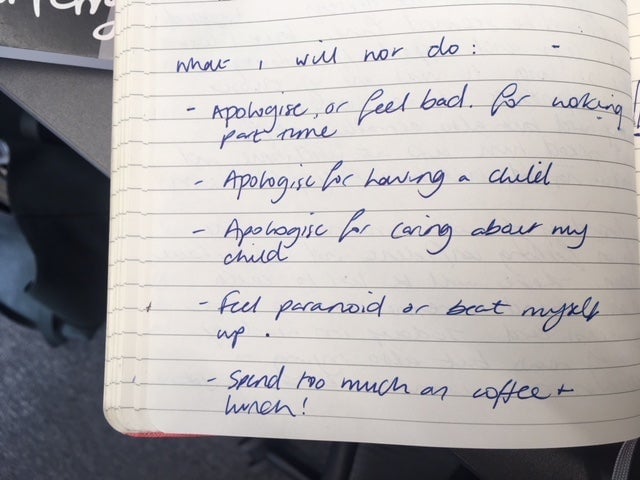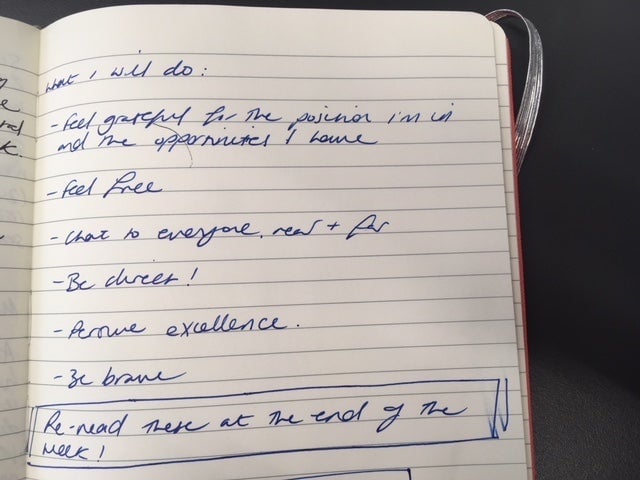All the things I’ve learned about work in the 2.5 hours I’ve worked this year
This morning, I found it hard to look at my son.


This morning, I found it hard to look at my son.
Over the year since he was born, I’ve become addicted to gazing at his eager little face. But today, as he sat in his high-chair putting peanut butter on some stackable cups, I was preparing to return to the office after a year on maternity leave. Holding the two responsibilities in my mind at once—job, baby—was threatening to make my brain short-circuit.
It’s a complex moment for many new moms. There’s excitement, guilt, loss, and even a sense of (justifiable) fear. After all, women’s careers often take a knock when they have children. Some of this is because some women switch to working part-time, but there are other factors at play. By the time her first child is an adult, a mother in the UK will earn a third less than a similarly-educated man, according to the UK’s Institute for Fiscal Studies. A 2018 report from PwC found that 48% of returning mothers globally felt overlooked for special projects or promotions; an even higher percentage were susceptible to that feeling if they weren’t white or Western.
Employers can, and should, shoulder the responsibility for re-integrating mothers in a way that makes them feel valued and secure. But heading back into work, I wanted to try to prepare myself for the competing priorities of my job and family life. (Caveat for all parents: Of course, childcare is work too.) Here are a few things other parents may want to do as they prepare for reentry into the office.
Take a day—or more—to reset
Somewhere in the fog of baby days and nights, back in a seemingly endless winter, I made a good decision: I’d take one day before I went back to my job in September to do neither paid work nor childcare.
That one day turned out to be crucial. Here’s what I did with that block of time:
- Readied my son for nursery and dropped him there. (“I dropped him, but he seems fine!” I texted my husband. “You dropped him??!” he texted back. We are not yet used to our new life.)
- Cycled to the pool. By the time I got there, I’d stopped crying.
- Swam.
- Sat down for some coffee and breakfast.
- Had a massage.
- Read. For the rest of the day: News, books, articles. My brain responded with the synaptic equivalent of one of those magic cardboard Christmas trees onto which you pour water and which then sprout multi-colored crystals.
- Made two impromptu lists of work goals.
That single calm day proved to be a crucial interlude. One truly free afternoon opened up a space to have some useful thoughts about how to approach the coming weeks. It also helped me practice being away from my son.
“Some people get back and their in-tray is not full, so they can spend all their time fretting,” said Lisa Unwin, a former Arthur Andersen and Deloitte consultant who now runs She’s Back, an organization dedicated to helping women return to work after a break. She advises taking ample time to settle a child into childcare before returning. My experience suggests that the settling time isn’t just for the child.
Create “anchors”—goals that will help you navigate your return
The aims that I scrawled down on my free day aren’t brilliant or comprehensive. But I was focused on the mindset that I wanted to have as I went back to the office.
First, I wrote a list of what I would not do when I went back for my job: Feeling guilty for working part-time or for having a kid ranked high on the list.

Then I wrote a list of the kind of mindset I did want to have going in: Gratitude rather than worry; enjoying the freedom I have to experiment; and being direct in conversations with my colleagues.

At the end of the lists, I scribbled: Re-read these at the end of the week! Good intentions are easy to forget. Perhaps, I realized, the important thing isn’t what the goals are, but giving myself footholds so I can keep on track. Writing down your intentions is one option; arranging to meet a friend at the end of the week, or to go out for an hour alone at the weekend, could be others.
Arrange a friendly space at the office
After arriving at the office, I hauled all my ergonomic equipment out of storage: The pyramid-shaped keyboard and the mouse that looks like a Walnut Whip, the yoga blocks I put my feet on, the screen stands and back support. This is a personal obsession (my partner calls it “Werbernomics”), but my back problems are extremely common: sitting at desks hurts us. Coming back, I realized again the importance of taking time to set up a space so that it’s comfortable. For a person returning from a break and feeling the pressure to prove oneself and reintegrate, a feeling of safety is invaluable.
Remember that people are the workplace
A lot of parents may feel pressure to get things done upon their return. But re-connecting with colleagues and managers should be right at the top of that list, Unwin advises. It’s “a massive deal” to make the transition back to the office, she says, so she advises making sure that reality is on other people’s radar as well. That means it may be a good idea to schedule meetings, lunches, and coffee dates ahead of time with colleagues. One-to-one meetings have a different energy to groups or the general chit-chat of open-plan offices.
A phone meeting and a short in-person coffee on my first day gave structure to a daunting span of time. I’m also now more aware of those people at Quartz who have been negotiating between work and childcare for a while: Kudos to them.
Don’t be too hard on yourself
The list I made ahead of my first day of work is full of reminders that no one will think ill of me for having a child, or for caring about him. Many companies are, gradually, becoming more flexible and family-friendly, realizing that without such changes, they’ll bleed talent. The only way to normalize those policies—like the ability for parents to leave in time for daycare pick-up—is to embrace them without shame.
But even in an understanding firm, it’s hard to return to work and feel like the same competent person you always were, yet simultaneously changed in ways you can’t even describe. And it’s hard to imagine your child in the company of strangers. Strangers who will fine you £1 for every minute you’re late to pick-up.
I’m doing my best to avoid feeling guilty for being away from my child—and for sometimes enjoying the break. A friend, returning to work the same day, texted to say she’d been in tears. “It’s like a part of my body is missing!” she wrote. I know that feeling.
The flip side, however, is the luxury of having time in the office to concentrate on one intellectually stimulating task. “Do you find you ever forget you have a son?” a filmmaker friend emailed me, also on my first day back. “I did that the other day for two hours and it was bliss.”
He added: “The bliss is also remembering you have one, of course.”